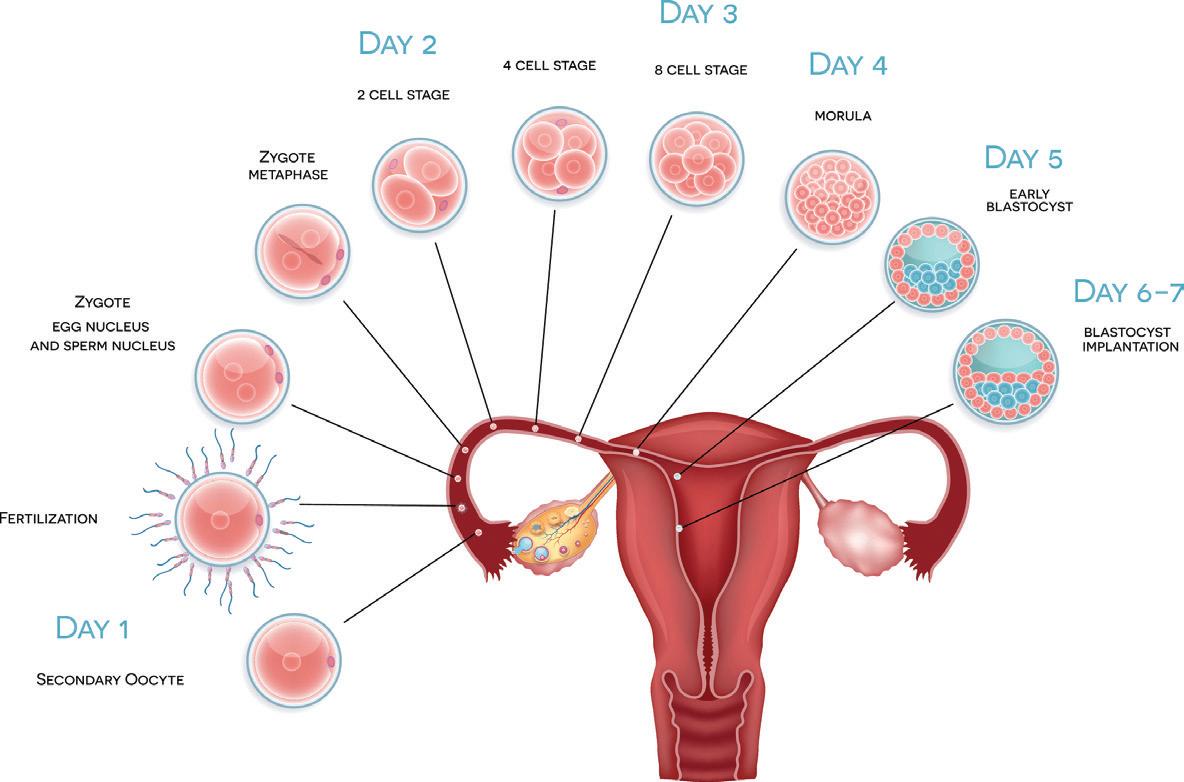
6 minute read
Welcome
The Human Reproductive Story
CONSIDER THE CHALLENGE
When you consider the complexity involved in human reproduction, you begin to realize it’s a miracle that we exist at all. That a tiny oocyte (the egg) – a cell the size of a grain of sand – and a mature human sperm cell (which is one hundred times smaller than the oocyte) manage to find each other and combine to create a human child is one of the most amazing creations of the universe. The average chances of conceiving naturally and delivering a baby are about 20% per cycle in the first 6 months of trying, rates go down to 1-5% after about 18-24 months, and significantly diminish after age 40.
INFERTILITY FACTORS
Our ability to answer the question why couples struggle to conceive or carry a baby to term is somewhat limited. Factors such as hormonal, anatomic, immunologic and genetic/ chromosomal dysfunction are just a few of the causes we may identify. Since a woman is most fertile in her teens and early 20s, we know that the postponement of childbearing is a major cause of infertility. Failed implantation and repetitive early and late pregnancy loss are also likely related to infertility and have similar and overlapping causes. In general, there are four main contributing factors to infertility: Ovulatory factors, Tubal and Uterine factors, Male factors, and Unexplained factors. A couple facing infertility may be experiencing one or more of these obstacles in both the male and female partner. But, you are not alone. Nearly 1 out of every 8 couples of reproductive age is affected by infertility.
OUR MISSION
Our mission at CNY Fertility is to guide you on your journey with a comprehensive evaluation and treatment options while integrating both eastern and western methods. Increasingly, we are seeing that our food is both a medicine and a toxin. By incorporating functional medical ideas to healing, you can enhance your chances of success for both natural conception and assisted techniques.

Your First Visit or Phone Consultation
Whether in person or over the phone, your initial fertility consultation is an important one. We want you to feel comfortable and able to ask any questions you may have. For many, your initial consultation with one of our physicians, nurse practitioners, or physician assistants is really just a discussion. The primary goal is for us is to listen and understand your hopes and expectations so that we can collectively create a suitable plan of action.
A provider will review your chart and discuss your medical history. Those coming to our office for an in-person consultation often take advantage of the opportunity to have bloodwork, a semen analysis, HSG, or other female and male testing done during their consultation.
You can expect your initial consult to last around 30-60 minutes. If you suspect or know that you are suffering from infertility, it is best if both partners (if applicable) are able to be present during the office appointment or phone consultation. The focus of this initial consultation is you, and ultimately you are in control of every decision that is made. With the incredible online resources available these days, many clients come to us already knowing what treatment they want. Others, however, require more guidance. Regardless of where you are in your understanding of your fertility issues, we are here to answer any and all of your questions as well as educate you on all of your treatment options.
After discussing your medical history and goals, we may recommend a certain course of action, but we will never force anyone away from the treatment they desire. At CNY Fertility, our focus is always YOU. We don’t focus on boosting our “success rates,” and have never found the need to artificially inflate our numbers by denying treatment to those with “lower chances of success”. Remember, odds and chances of success are merely statistics. Statistics are based on populations, but you are a unique individual.
A Financial Counselor will also be available to review your insurance coverage and the costs involved in any agreed-upon treatments. If you don’t have insurance coverage, financing options can be explored as well. You will also have the opportunity to learn about Eastern holistic therapies that can improve your chances of conceiving—Yoga, Acupuncture, Massage, and Meditation.
PREPARING FOR YOUR CONSULTATION
Here is a list of things we recommend you have prepared for your initial consultation:
A copy of your medical records from your OB/GYN, primary care physician (PCP), or any other fertility center. Insurance cards for both partners (if applicable) if your consultation is in office. Insurance authorizations (if applicable) A list of questions: many couples and individuals find it helpful to write down a list of questions beforehand so they don’t forget anything during their consultation. We are happy to answer your questions at any time, but your consult is a great time to get as many of them answered as possible.

The Basic Fertility Evaluation

FEMALE At this first visit, the woman will be asked about the regularity of her periods, if she experiences severe menstrual cramps, pelvic pain, vaginal bleeding, her method of contraception, any history of surgeries and infections. If previous fertility evaluation and treatments have been performed, these will be reviewed and the results evaluated. A painless vaginal ultrasound will be performed as well. There is no need to reschedule this appointment if you are currently menstruating. Preconception baseline bloodwork will also be drawn at your first visit.
RECOMMENDED DIAGNOSTIC TESTING FOR FEMALE
Preconception baseline blood work (yearly) includes CBC (complete blood count), CMP (complete metabolic panel), Hepatitis, HIV, Cystic Fibrosis, Estrogen, FSH (follicle stimulating hormone), Progesterone, HCG (pregnancy hormone), TSH(thyroid), Testosterone, Rubella, Varicella, LH (lutenizing hormone), and Prolactin.
If you have recurrent pregnancy loss or continuous failed implantation, additional testing will included: Lupus, NKC (natural killer cells), Karyotype (male and female), and ANA (antinuclear antibody).
Autoimmune testing for recurrent pregnancy loss (if necessary).
Hysterosalpingogram/Saline Sonohysterogram (HSG/SHG yearly) –to check condition of fallopian tubes and uterus.
Physical exam and pelvic ultrasound (monthly).
Hysteroscopy / Laparoscopy (diagnostic) –A surgical procedure done under anesthesia (general) to evaluate uterus for polyps, fibroids, endometriosis and adhesions.

Normal Low Normal
MALE The man will be asked questions regarding current and past medical conditions, past surgeries, infections, drug and medication use. A semen analysis should be performed to determine the likelihood of the man’s ability to reproduce. This analysis can also help to determine appropriate next steps.
Semen Analysis: A typical semen analysis will evaluate all of the following:
Total Volume: 2-5 milliliters is a normal volume. A very low volume indicates that the seminal vesicles may not be making enough fluid or that these ducts may be blocked. It may also indicate a problem with the prostate gland.
Sperm Count: 40 million to 300 million is the normal range for the number of sperm per milliliter. Counts below 10 million are considered poor; counts of 20 million or more may be fine if motility and morphology are normal.
Motility and Velocity: 2 aspects of motility will be evaluated:
The number of active cells as a percentage of the total number of cells (rated from 0-100%, at least 50% should be active)
Abnormal Normal Abnormal
The quality of the movement of the sperm (rated from 0-4. A score of 2 or more is satisfactory.)
Morphology: examines the shape and size of the sperm head. Normal results are when 14% or more of the sperm have normal shaped heads. Men with less than 4% of normal shaped sperm may have a significant infertility problem.
RECOMMENDED DIAGNOSTIC TESTING FOR MALE
Semen analysis (yearly) Chromosome testing / male hor mone blood work (if necessary) Possible testicular/scrotal ultra sound to rule out varicocele Preconception baseline blood work drawn at consultation (with male factor infertility) TSH (thyroid), Testosterone, Prolactin, LH (lutenizing hormone), and FSH (follicle stimulating hormone)










